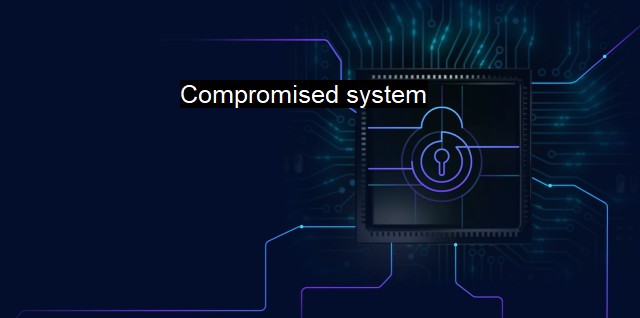What is Compromised system?
The Importance of Antivirus software in Preventing Compromised Systems: Understanding the Risks, Signs, and Solutions in Our Interconnected World
A compromised system in the realm of cyber security refers to a computer, network, or information system that has been infiltrated and manipulated by unauthorized individuals, usually cyber criminals or hackers. This unauthorized access can happen through several means such as viruses, malware, exploiting software vulnerabilities, or social engineering tactics.One common type of system compromise involves malware, including viruses, worms, trojans, ransomware, spyware, adware, etc. These malicious programs are designed to infiltrate and damage computer systems without the users' consent. Once infiltrated, cyber criminals can manipulate the system to gain access to confidential data, delete files, disrupt performance, or use the system as a launch pad for attacking other systems.
In a ransomware attack, cyber criminals might encrypt an organization's data and demand a ransom to restore access. This is a clear-cut and explicit case of a system compromise. not all systems are compromised to such a visible degree, some attacks are much subtler with hackers concealing their activities jubilantly in the background.
Another way systems can be compromised is through exploiting software vulnerabilities. Many software providers regularly release updates to patch known security vulnerabilities. if the users don't promptly update their software, they leave their systems open to compromise. Cyber criminals constantly scan the internet to find systems that haven't been updated, and they try to exploit known vulnerabilities to gain unauthorized access.
Social engineering attacks also represent a common tactic for compromising systems. Such attacks rely less on technology and more on manipulation of human psychology. Cyber criminals might send phishing emails that trick recipients into clicking on malicious links which, in turn, downloads malware onto their systems. Or, they might use pretexting, another form of social engineering, in which they fabricate a situation or use deception to induce individuals to disclose valuable information.
The threat of compromised systems elevates the importance of robust cybersecurity protocols and efficient antivirus solutions in every digital environment – from single-user personal computers to large networked corporate systems. Cybersecurity refers to the collective methods, technologies and processes designed to protect computer systems and networks from damage, unauthorized access or manipulation.
Antivirus software is a significant component of these measures. It plays a crucial role in detecting, thwarting and eliminating threats. By continuously scanning the system for suspicious activity, identifying known threats, isolating infected files, and regularly updating its virus definitions, antivirus software can help to keep a system secure. With the proliferation of sophisticated threats like zero-day exploits, the role of antivirus software has expanded to include heuristic checking – flagging unknown suspicious activities that could indicate a software compromise.
Another crucial element of cybersecurity includes regular software and system updates or patches. Many system compromises occur because well-known vulnerabilities are left unpatched and available for attackers to exploit. Ensuring systems are regularly updated helps in closing these security gaps.
While antivirus and cybersecurity measures form a strong base, reinforcing your protection tactics with user education and stringent security policies is essential. Users need to be vigilant about social engineering attacks and be educated about safe internet behavior, such as not clicking on unknown links or installing software from untrusted sources.
a 'compromised system' is one which has been infiltrated by cyber criminals. This infiltration can occur via different methods including malware, software vulnerabilities and social engineering. Efforts to mitigate such compromises involve deploying effective antivirus and cybersecurity measures, keeping software updated, and fostering better digital hygiene through user education.

Compromised system FAQs
What is a compromised system?
A compromised system refers to a computer or network that has been infiltrated by unauthorized individuals or malicious software, allowing them to gain control or access sensitive information.How can I tell if my system has been compromised?
Some signs that your system may have been compromised include slow performance, unusual pop-ups, unauthorized access to files or programs, unexpected changes to settings, and strange network activity. It's important to run regular antivirus scans and keep your software up to date to prevent compromise.What should I do if I suspect my system has been compromised?
If you suspect your system has been compromised, disconnect from the internet and immediately run a full antivirus scan. Change your passwords, check for any unauthorized access to your accounts, and report the incident to your IT department or a cybersecurity professional. Depending on the severity of the compromise, you may need to wipe your system and reinstall your software.Can antivirus software prevent system compromise?
While antivirus software can help detect and block known malware and viruses, it's not foolproof. It's essential to keep your software up to date, run regular scans, and practice safe online behavior to minimize the risk of compromise. Remember to use strong passwords, avoid clicking on suspicious links or attachments, and only download software from trusted sources.| | A | | | B | | | C | | | D | | | E | | | F | | | G | | | H | | | I | | | J | | | K | | | L | | | M | |
| | N | | | O | | | P | | | Q | | | R | | | S | | | T | | | U | | | V | | | W | | | X | | | Y | | | Z | |
| | 1 | | | 2 | | | 3 | | | 4 | | | 7 | | | 8 | | |||||||